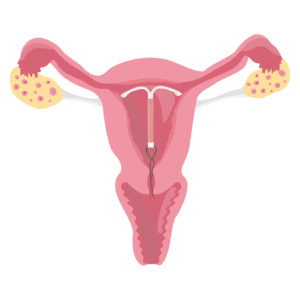There are many different types of contraception available to women, with different benefits, side effects, effectiveness, and risks. Choosing the right one for you is important. You should have a discussion with your doctor about which method is right for you, and how to use that method correctly. Most healthy women can safely use any contraceptive method they choose, and can do so safely for as long as they choose. The following is a brief introduction to some of these methods.
- The hormonal Intrauterine System ("IUS" - Mirena, Jaydess, Kyleena)
- This is a small device that is inserted into the uterus (usually during a clinic visit, similar to having a pap smear done). The stem of the device contains a progesterone that is slowly released over the duration of its use. The Mirena and Kyleena last for 5 years; Jaydess lasts for 3 years. This method does not contain any estrogen.
- The Copper IUD
- This is a small device that is inserted into the uterus (usually during a clinic visit, similar to having a pap smear done). There are no hormones in the copper IUD. These can be used from 3 to 10 years depending on which device is chosen.
- The Injection (Depo Provera)
- This is an injection that is given every 3 months. It contains a progesterone. It does not have any estrogen.
- Combined Hormonal Contraception
- These are contraceptives that contain both an estrogen and a progesterone. These can be taken as an oral pill daily, or by a vaginal ring which is replaced monthly, or by a skin patch that is replaced weekly.
- Progesterone-Only Pill (POP or "mini-pill")
- This is a pill that contains only progesterone and can be used in women with contraindications to taking estrogen.
- Condoms
- These are used with each act of intercourse as a barrier to physically prevent the sperm from reaching an egg. This is also the only option that will help to reduce (but not eliminate) transmission of sexually transmitted infections such as chlamydia, herpes, and genital warts. Condoms should be used even if you are using other contraception in order to reduce your risk of infection.
- Emergency Contraception
- This is used shortly after unprotected intercourse has occurred to prevent pregnancy.
